BY YOU and FOR YOU! THE LAQ
Don’t miss the TIP OF THE MONTH on these pages!
MUHC LYMPHEDEMA CLINIC THREATENED WITH CLOSURE
SIGN THE PETITION
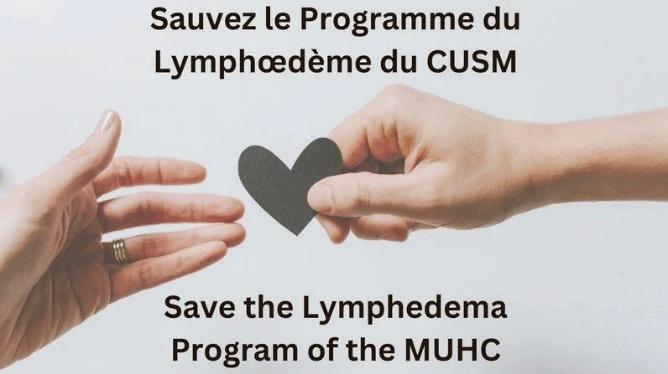
The Lymphedema Clinic of the MUHC will close its doors on April 1, 2024, because its funding was cancelled with 6 weeks’ notice. This decision is inhumane for lymphedema sufferers who already have so little access to care. Protest! Sign the petition!
* Les dons faits sur le site de la pétition sont versés à change.org
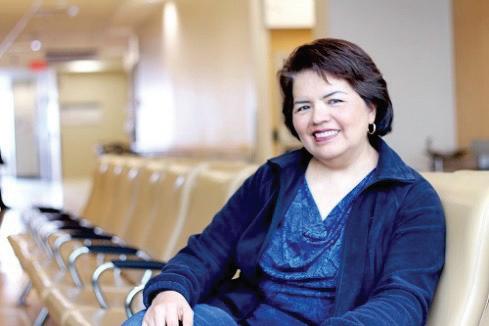 Georgina Cama, patient
Georgina Cama, patient

SAVE THE CLINIC
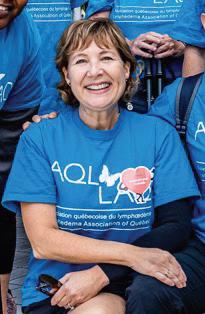 Anne-Marie Joncas, president, LAQ
Anne-Marie Joncas, president, LAQ
The LAQ supports the petition launched by LAQ member and clinic patient Georgina Cama with numerous actions. The Board of Directors, represented by Anne-Marie Joncas, President, assures you that every effort is being made to protect your care.
Are you a patient of the MUHC Lymphedema Clinic? Your follow-up care will end on April 1. Unless the situation changes, you’ll receive a call from the clinic to find out what happens next.
SIGN AND SHARE!
Not a patient of the Lymphedema Clinic of the MUHC? Your physicians, nurses, orthotists and therapists in the public and private sectors will no longer be able to benefit from the Clinic’s expertise to optimize your care. What’s more, the LAQ will lose its scientific partner who provides evidence-based support for our requests to the Ministry of Health and Social Services for your compression garments and decongestant treatments.
SIGN AND SHARE!
Would you like to support the LAQ’s actions to defend patient access to lymphedema care, including access to the MUHC Lymphedema Clinic? DONATE
FEBRUARY 2024
The LAQ has been informed by Dr. Anna Towers, Director of the Lymphedema Program of the MUHC, of the very unfortunate news that funding for the Lymphedema Program from the Cedars Cancer Foundation will end on March 31, 2024, after ten years of support.
Like Dr. Towers and her team, we are devastated by this withdrawal of funding on such short notice, which will force Dr. Towers to cease operations as of April 1, 2024. Worse still, the end of funding will also mean the closure of the Clinic as of April 1, and the end of specialized assessments and treatments for the lymphedema patients that Dr. Towers’ ultra-qualified team of therapists follow on a regular basis. Some have appointments already scheduled for the next two years! We think it’s cruel to let down all those patients who can’t afford private treatment, some of whom are so serious and complicated that they need a truly specialized approach.
It makes no sense for the Cedars Cancer Foundation to announce this unfortunate news so abruptly and without proposing a solution with the MUHC to ensure the continuity and sustainability of the Program, which serves an important community of cancer victims.
The LAQ cannot imagine the effect on the Québec healthcare network if all Program patients ceased to be seen and cared for overnight. We believe that, with the closure of the Clinic and the lack of financial resources, many of these patients will abandon their treatments. They will end up in emergency wards with serious complications, such as cellulitis, a serious infection leading to life-threatening sepsis. What sadness, and what a major impact on these neglected patients, and on the Québec healthcare network already overwhelmed by systemic problems!
What’s more, the Program team ensures the scientific content behind the teaching that the LAQ provides to people with varying degrees of lymphedema, all of whom urgently need education and support to achieve self-management and a better quality of life. Quality lymphedema education is lacking in the public healthcare system, and we need to (...)
An issue of distributive justice in healthcare
The Lymphedema Program of the MUHC been charitably funded by various Foundations, Associations, and individuals since 2006. That charitable funding has run out and the clinical services are threatened with closure on April 1, 2024. But why should basic clinical services be charitably funded? According to the LAQ and the majority of stakeholders in the field, public funding for the diagnosis of lymphedema related to cancer or other causes, and for patient services, is long overdue. We are seeking such public funding to ensure patient care and access to our specialized lymphedema program, which serves all of Québec.
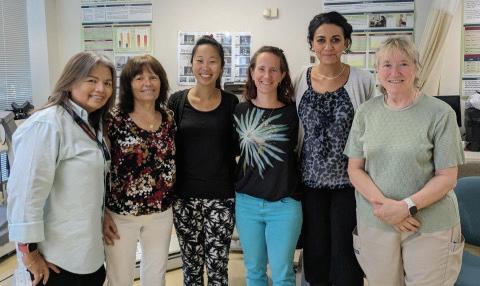
ABOUT THE LYMPHEDEMA PROGRAM OF THE MCGILL UNIVERSITY HEALTH CENTRE
This program, which focuses primarily on cancer-related lymphedema, is making advances that are beneficial to all Québec patients, whatever the cause of their lymphedema (cancer, primary, trauma, disability, obesity, chronic venous insufficiency).
Cancer-related lymphedema is a chronic condition that can appear during or weeks, months, or years after cancer treatments. Currently, one in seven cancer survivors suffer from lymphedema. 85% of these are women. In Québec, there are approximately 75,000 survivors of cancers such as breast, prostate, ovarian, melanoma, sarcoma, head and neck, bladder, and colorectal cancer living with this incurable condition. Lymphedema is associated with functional and psychosocial problems and increases the risk of infection.
The Lymphedema Program of the MUHC is an internationally designated LE&RN Network of Excellence, in the same league as the lymphedema programs at the Mayo Clinic and the Memorial Sloan Kettering Cancer Center in the USA. Founded in 1994, this unique interdisciplinary program has served over 20,000 lymphedema patients to date.

Comprised of a specialized interdisciplinary team of lymphedema physicians and therapists, this program is recognized provincially, nationally, and internationally for its expertise in the following three areas:
- Clinical excellence: To provide patients interdisciplinary expertise in the clinical evaluation, diagnosis, and management of lymphedema
- Education mandate: To educate patients and healthcare professionals in the disciplines of medicine and allied health, and to contribute to the specialized training of the next generation of clinicians
- Research mission: To act as scientific leaders in the promotion and advancement of best practices in the early identification and management of lymphedema. To supervise university students at all training levels on lymphedema-related research projects.
From left: Georgina Cama, patient ; for the Clinic: Nathalie Côté, nurse, Angela Yung, physiotherapist, Marie-Eve Letellier, kinesiologist, Marize Ibrahim, physiotherapist, Dr. Anna Towers
WE READ FOR YOU
MUHC LYMPHEDEMA CLINIC EXPERTISE AT THE SERVICE OF CANADIAN FAMILY PHYSICIANS
Cancer-related Lymphedema: Overview, Diagnosis, and Management
This article, published in Oncology Briefs, Canadian Family Physician, October 2023, is authored by two leading caregivers and researchers from the renowned Lymphedema Program of the McGill University Health Centre. They are Dr. Geneviève Chaput, who holds a Casley-Smith certification in lymphedema; is Assistant Professor at McGill University in Montréal, Que; is an attending physician at the McGill University Health Centre (MUHC); and is Medical Chief of supportive and palliative care services at the Lachine Hospital of the MUHC. As well as Marize Ibrahim, who is is a lymphedema therapist and physical therapist specializing in oncology at the lymphedema clinic of the MUHC. The work of Drs. Geneviève Chaput and Marize Ibrahim, based on the expertise developed over the past 30 years by the MUHC Lymphedema Program team, will enlighten thousands of family physicians called upon to assess and diagnose lymphedema patients.
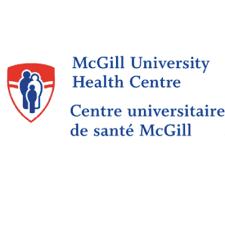


L’info AQL has prepared a summary outlining this enlightening article for all caregivers.
Lymphedema Overview: Lymphedema, an inflammatory condition resulting from lymphatic system damage, has two classifications—primary (due to malformation) and secondary (resulting from trauma, chronic overload, or cancer and treatments). This article focuses on cancer-related lymphedema, which can develop post-oncologic treatments. The lymphatic system’s main functions include maintaining fluid balance, absorbing fats, protecting against invaders, and eliminating waste products.
Epidemiology, Risk Factors, and Diagnosis: Prevalence is challenging to determine due to the absence of a universal definition. Cancer location and treatment types influence the incidence, with breast cancer being a major contributor. Estimates suggest over 300,000 individuals in Canada are affected. Cancer-related lymphedema can result from various factors, including tumor compression and chemotherapy. Trauma, obesity, and other non-cancer-related factors also increase the risk. Diagnosis involves a straightforward assessment based on history and physical examination findings, with early identification crucial for minimizing progression.
History and Physical Examination: Family physicians should screen patients for lymphedema risk factors and inquire about potential early signs. Onset is usually insidious, with early signs including tightness of clothes, sensations of fullness or heaviness, and intermittent limb swelling. Head and neck cancer-related lymphedema can present with swelling, swallowing difficulties, voice changes, and internal swelling. Severe pain is not typical of lymphedema.
Dre Geneviève Chaput, Clinique du lymphœdème, CUSM
Marize Ibrahim, Clinique du lymphœdème, CUSM
Physical Examination and Diagnosis: Physical examination involves evaluating vascular system and palpating lymph nodes. Dermatologic examination assesses skin integrity, and tests like the pitting test and Stemmer sign aid in diagnosis. Limb volume difference is measured, and imaging may be considered if other conditions are suspected. Lymphedema diagnosis is classified into four stages based on findings.
Lymphedema Management: Cancer-related lymphedema is incurable and requires sustained support. Decongestive lymphatic therapy, the criterion standard, aims to educate, reduce limb volume, optimize functional status, address body image concerns, and promote self-management. It comprises two phases: volume reduction and maintenance.
Compression therapy, lifestyle habits, and risk reduction strategies are essential components.
Compression Therapy: Medically prescribed compression garments are worn daily, with prescription based on limb severity. Contraindications should be considered. Healthy lifestyle habits and risk reduction strategies are crucial for long-term management. Family physicians play a vital role in providing support, prescribing compression therapy, and referring to certified lymphedema therapists.
Conclusion : Conclusion: Family physicians can have a meaningful impact on patients with cancer-related lymphedema. Rapid onset of limb swelling with skin changes should trigger ruling out malignancy. Diuretics are not recommended, and surgical interventions are still under study. Family physicians are well-suited to provide care, with more complex cases referred to specialists. Regular follow-ups and adherence to management strategies contribute to improved patient outcomes.
THE LAQ HIGHLY RECOMMENDS THAT YOU READ THE ORIGINAL ARTICLE PUBLISHED BY DR GENEVIÈVE CHAPUT AND MARIZE IBRAHIM, Cancer-related lymphedema, Canadian Family Physician } Vol 69: OCTOBER 2023.
Find out more about the Lymphedema Program of the McGill University Health Centre
THE HEALTH BENEFITS OF WALKING: FIVE COMPELLING REASONS
You know that walking stimulates lymphatic circulation, which is extremely beneficial in cases of lymphedema. But are you aware of all the other benefits of walking for your general health?
Engaging in regular walks offers a myriad of health benefits, promoting a healthier heart, increased energy levels, a longer life, and more. According to many sports medicine physicians, walking positively impacts various bodily systems, making it a valuable activity.
Despite being low-impact, walking qualifies as a moderately intense aerobic activity, provided it is done at a pace that allows conversation but makes singing challenging. This ensures cardiovascular engagement. It is recommended to maintain a pace that slightly elevates the heart rate, using the “talk test” to gauge the effectiveness of the walking routine. The ideal target is 150 minutes of such walking per week, distributed across multiple days.
Walking not only serves as an aerobic exercise but also strengthens leg muscles and the core, essential for maintaining stability during each step. However, it’s crucial to incorporate rest days to prevent injuries, with intense walking workouts recommended no more than five days a week. Even on rest days, light to moderate-intensity walking is encouraged for its overall health benefits
Additional Health Benefits of Walking:
1. Increased Lifespan: A study involving over 2,000 adults found that those who walked at least 7,000 steps per day had a 50 to 70 percent lower risk of all-cause mortality over an 11-year period compared to less active individuals. This emphasizes that being active positively impacts various bodily systems, contributing to overall well-being.

2. Enhanced Bone Strength: Walking is a weightbearing exercise that supports bone health, potentially reducing the risk of osteoporosis. The American Academy of Orthopaedic Surgeons recommends starting with brisk 10-minute walks three times a day to improve bone strength, particularly in the legs and spine.
3. Improved Mood: Short walks, even as brief as 10 minutes, have been shown to boost mood, especially in alleviating feelings of fatigue. Movement helps shake off low energy, ultimately contributing to an improved sense of well-being. It serves as an accessible and effective strategy to combat mood-related issues.
4. Effective for Weight Loss: Combining a caloriereduced diet with walking for 2.5 hours per week has been proven to yield better results than diet alone in terms of fasting insulin levels and fat loss. This approach ensures not just weight loss but specifically targets fat loss, providing a sustainable and manageable strategy for those aiming to shed extra pounds.
5. Promotes Heart Health: Regular walking has a positive impact on heart health by reducing cholesterol levels. Studies have shown that a walking routine for overweight or obese individuals can lead to a decrease in both total cholesterol and LDL (“bad”) cholesterol. Additionally, walking can help lower blood pressure, another crucial factor in maintaining heart health.
In conclusion, walking is a versatile and accessible exercise with a multitude of health benefits. Incorporating a brisk walk into your routine can contribute to a healthier and more active lifestyle, positively influencing various aspects of physical and mental well-being.
References:
https://health.gov/sites/default/files/2019-09/Physical_Activity_Guidelines_2nd_edition.pdf
https://jamanetwork.com/journals/jamanetworkopen/ fullarticle/2783711
https://orthoinfo.aaos.org/en/staying-healthy/exercise-and-bone-health/
https://www.ncbi.nlm.nih.gov/pmc/articles/ PMC6064756/
https://www.cochrane.org/CD008823/HTN_effect-walking-blood-pressure-control
A HEARTFELT FOUNDATION
Thank you Tenaquip!

What a loyal donor the Tenaquip Foundation is!
For a third year, the LAQ has benefited from the generosity of this Québec company. A donation of $5,000 was made to support our work with lymphedema sufferers. With a program that supports causes close to the hearts of its employees, it’s no wonder that Tenaquip is one of Canada’s Best Managed Companies.
A special thank you to Lorna Rock, LAQ member and board director, who takes care to submit the LAQ nomination to her employer every year.
Thank you, Lorna!
Thank you Tenaquip!
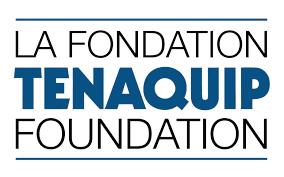
THE STORE OF HOPE
Not sure how to measure your limb? Drop by the Store of Hope to get a measuring tape, complete with photos and measuring instructions from lymphedema therapists.
https://infolympho.ca/boutique/
TRIBUTE TO DINO
Dino is gone. Constantinos “Dino” Christofidis, the loyal companion of Rachel Pritzker, our founder, passed away on January 29, 2024, at the age of 85, in Châteauguay, Québec. We cherish precious memories of this discreet and generous man, whose patience, unwavering support for Rachel’s projects and boundless generosity for the cause of lymphedema were invaluable.
Dino was a devoted husband, father, grandfather, brother, uncle and friend. He was a pillar of the family and a beautiful person with a big, warm and generous heart. In addition to his wife Rachel, he is survived by his children Selena, Galit, Dan and Jackie, grandchildren Evan, Abigail, Asher and Jonas, siblings Dimitra (March), Emmanuel “Mano” (Peggy) and Eleni “Nitsa” (Tony), and many families and friends who will remember him with love.
The LAQ will long continue to thank him for his friendship and unconditional support of our organization.
To honour Dino’s memory, we invite you to make a donation to the Kidney Foundation of Canada.
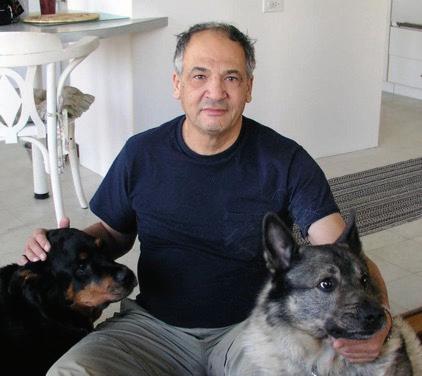
Store and support your
Shop the
LAQ!

NEED INFO ? IT’S FREE!
In doubt? Concern? Have a question? Need direction? Call 1 866-979-2463 / 514 979-2463
for our volunteer operator in our voice mailbox. Our volunteer will arrange for a therapist to call you back within 48 hours.
Please include your name, telephone number and the purpose of your call.

NEXT LAQ EDUCATION AND SUPPORT GROUP
Being active and moving every day





Your next online education and support group takes place on February 29, 2024, at 7 p.m.
Understand the benefits of being active and moving every day, especially for people MARIE-EVE LETELLIER, certified therapist at the MUHC Lymphedema Clinic.
Finding it hard to motivate yourself or adopt a new routine? Discover concrete strategies to get you moving! ZOOM presentation in French. Bilingual Q&A. This free event organized by the LAQ will take place on Thursday, February 29 at 7 p.m. Registration MANDATORY by clicking here

We look forward to seeing you!

This lymphedema event is made possible by the Lymphedema Association of Québec, whose mission is to support those at risk and those affected, while raising awareness of lymphedema as a chronic disease within the healthcare community.
TIP OF THE MONTH
BETTER BE SAFE…
Than sorry! Ask your doctor for an antibiotic prescription for cellulitis, which you can then add to your pharmacist’s file.
In the event of redness, heat or fever, you’ll have everything you need to take immediate action. Use a pen to mark out the infected area so you can monitor its progress. Monitor the area regularly throughout the day. Discontinue conventional lymphedema treatments, such as compression and manual lymph drainage, until your doctor, after consultation, advises you to resume them.
Symptoms don’t go away with antibiotics?
Go to the emergency room.
Cellulitis and lymphangitis can worsen into fatal sepsis if the infection reaches the bloodstream.


 Georgina Cama, patient
Georgina Cama, patient

 Anne-Marie Joncas, president, LAQ
Anne-Marie Joncas, president, LAQ














